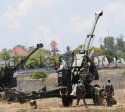BY
| April 3, 2018 |
[email protected] |
Indian security forces launched a decisive counter-terror operation yesterday in the Kashmiri districts of Shopian and Anantnag resulting in the deaths of at least 13 terrorists, three Indian security forces soldiers, and four civilians. The operation, which took out members of Jaish-e-Mohammad (JeM), Lashkar-e-Taiba (LeT) and Hizbul Mujahideen (HM), sparked large protests of angry civilians that clashed with Indian forces.
reported that the number of wounded could be as high as 70, many of them civilians. Regional reporting recounted that protestors threatened and threw stones at Indian security personnel, forcing soldiers to respond with tear gas, pellets, and even live ammunition.
Indian military officials praised the operation as a success, despite the response from protestors. At a press conference following the clashes, Indian Lt. General AK Bhatt
“Today is a very special day for security forces. Sunday was the biggest anti-militancy operation in the Kashmir Valley in a long time.”
Indian officials also gave the impression that the campaign was a response to a
in which Kashmiri terrorists abducted and killed an Indian soldier as he was attending a wedding in the area. Bhatt was
saying, “We have avenged his (Fayez’s) death.” Two terrorists allegedly responsible for Fayez’s 2017 murder were among those killed Sunday.
India has increased its presence and operational tempo in the Kashmir Valley over the last year as part of “Operation All Out,” an initiative announced in 2017 with the goal of quelling terrorism and bringing peace to the Jammu and Kashmir region. Clashes between Pakistani-backed terror outfits and Indian security forces have been a consistent reminder of a conflict that has been simmering for decades.
Many of the terrorists killed in past encounters were Pakistanis who crossed the border into Kashmir to engage Indian forces. However, the majority of the terrorists killed Sunday were identified as young
who had joined those Pakistani-backed terror groups.
That local angle likely contributed to the increasingly hostile protests that confronted Indian forces during and following the operation.
threw stones at Indian forces, and chanted anti-India slogans. To break up the crowds, the Indian soldiers fired tear gas, pellets and some live ammunition at the crowd. Exact numbers remain unclear, but 50-70 civilians were
wounded during the clashes, most with injuries sustained from the Indian pellet rounds. Indian forces did result to using live ammunition as S.P. Vaid, the director general of police in India-held Kashmir, confirmed that “six [protestors] had gunshot wounds,” according to
.
On Monday, thousands of people turned out to attend the funerals of the terrorists and civilians killed the previous day. Images and videos on social media show large crowds chanting “Azadi” — a term referencing desire for Kashmir’s independence from India — and waving the green and white flag of Pakistan. Many cities in the Kashmir region
entirely for the day in protest, while small groups continued to gather.
Pakistani officials and influential leaders of its sponsored terror groups in Kashmir have lashed out in statements since the operation, accusing the Indian government of human rights abuses and atrocities. Internationally-designated terrorist, founder and current leader of LeT, Hafiz Saeed released a video statement
for action from Pakistan to “raise the issue at international forums,” claiming that “Kashmiri youngsters are getting killed while waving the flag of Pakistan.”
According to the
, JeM also issued a threatening statement saying, “We will avenge every drop of blood of Kashmiri people, and this Jihad will continue till the mission of freedom is achieved.”
In multiple tweets, the
that they “and the people of Pakistan firmly stand for the people of Kashmir against the oppressive Indian regime,” and
that “this act of barbarism in Indian Occupied Kashmir is [a] violation of human rights.” According to
, Pakistan plans to dispatch high-level diplomatic officials around the world in an attempt to condemn India’s “brutalities and human rights abuses.”
Phil Hegseth is a social and digital media specialist at the Foundation for Defense of Democracies and a contributor to FDD’s Long War Journal.












